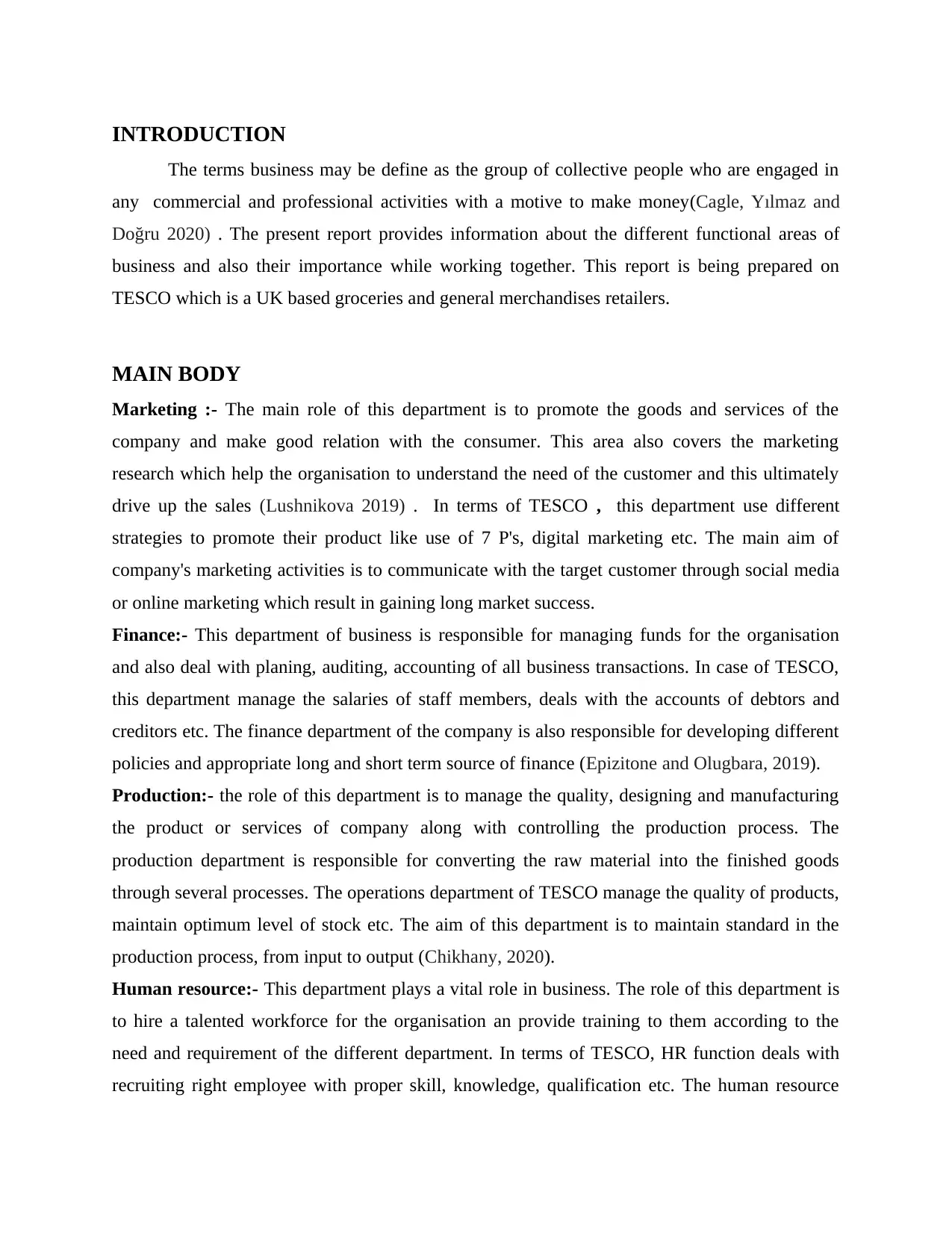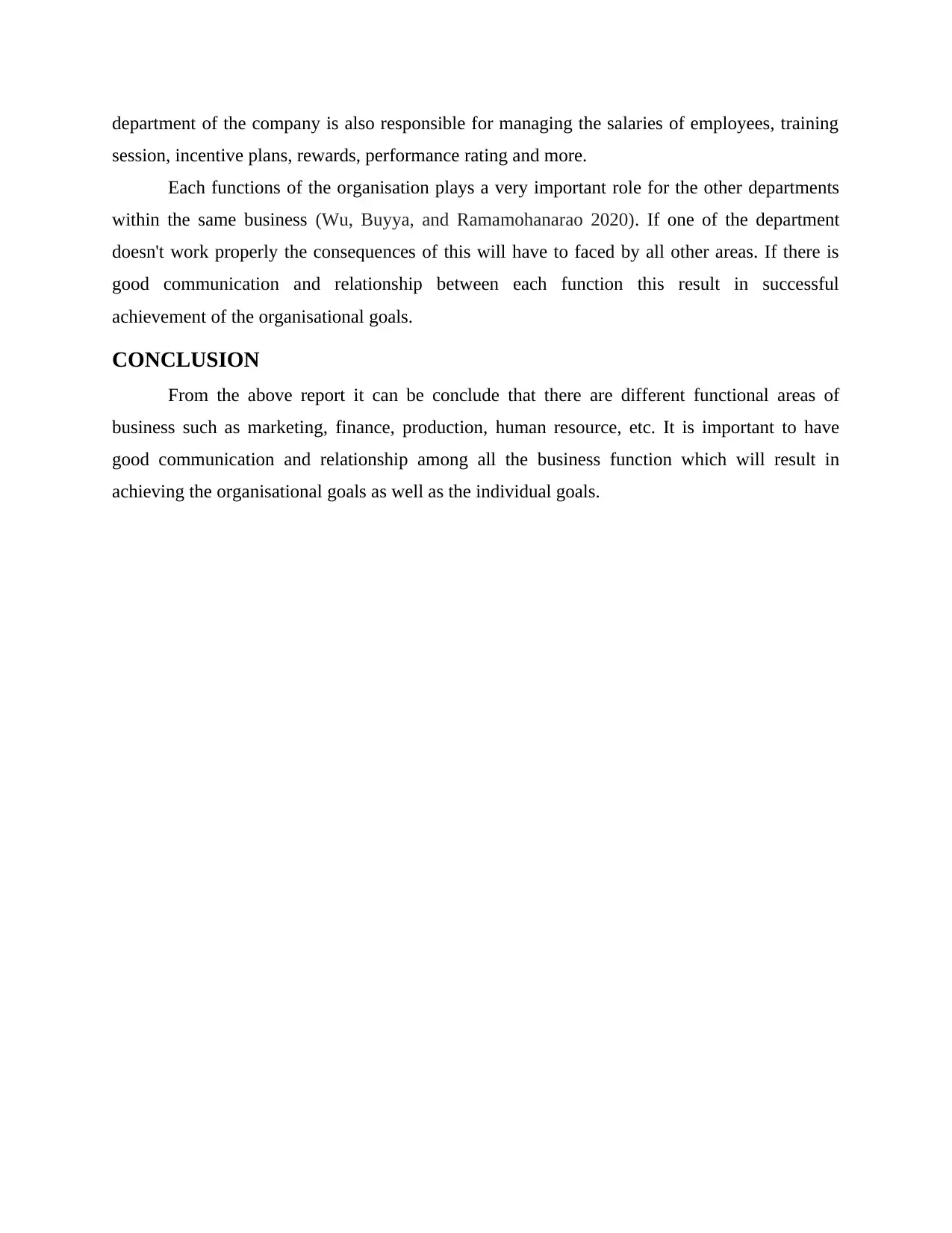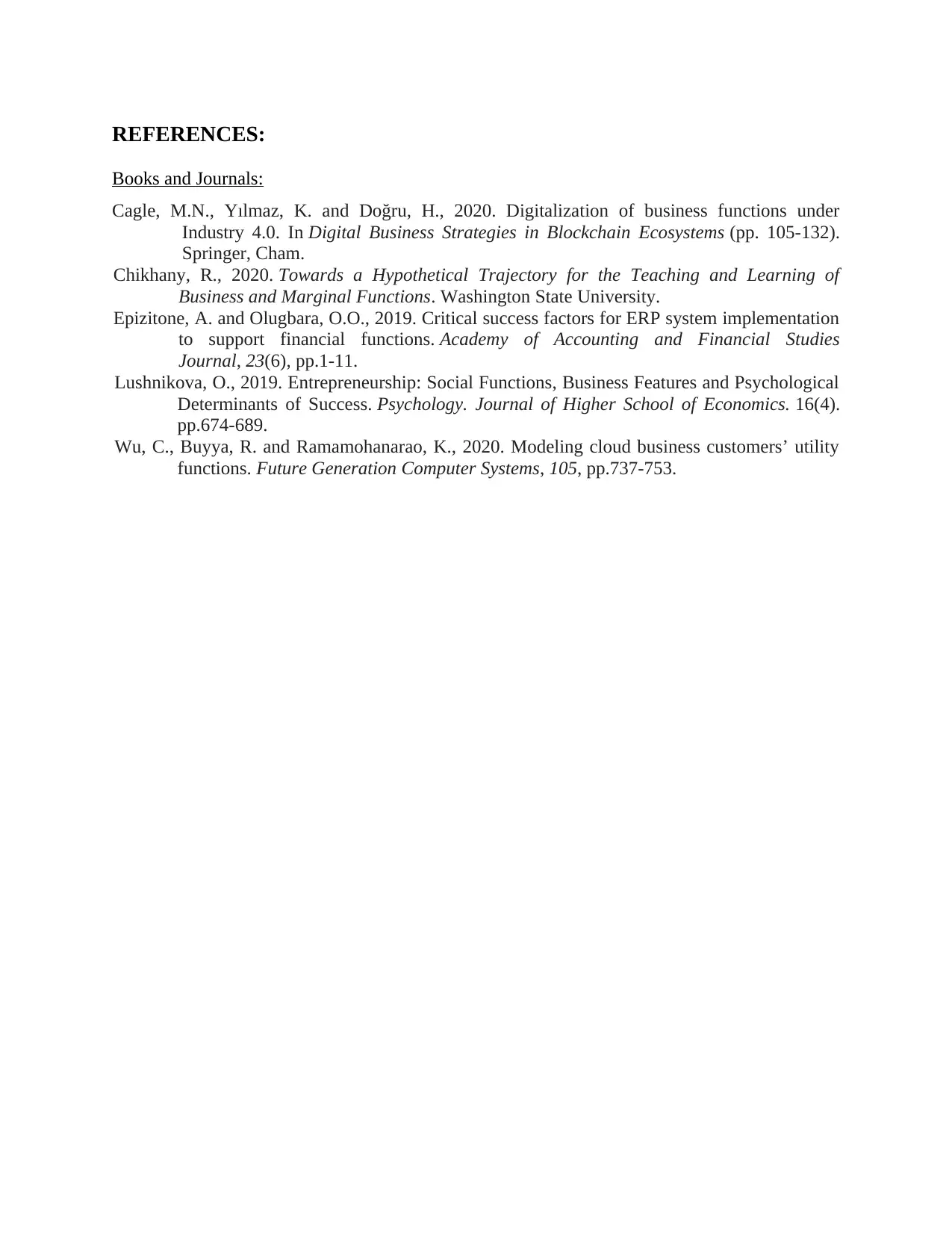Report on Functional Areas of Business: A Case Study of Tesco PLC
VerifiedAdded on 2023/06/18
|4
|760
|168
Report
AI Summary
This report examines the functional areas of business, focusing on Tesco as a case study. It highlights the importance of marketing, finance, production, and human resources departments within the organization. The report details the role of each department, emphasizing their interdependence and contribution to achieving organizational goals. It concludes that effective communication and collaboration among these functions are crucial for overall business success. The report also references academic sources to support its analysis of Tesco's business operations. Desklib provides access to this and other solved assignments for students.

The Graduate
Challenge
Challenge
Paraphrase This Document
Need a fresh take? Get an instant paraphrase of this document with our AI Paraphraser

INTRODUCTION
The terms business may be define as the group of collective people who are engaged in
any commercial and professional activities with a motive to make money(Cagle, Yılmaz and
Doğru 2020) . The present report provides information about the different functional areas of
business and also their importance while working together. This report is being prepared on
TESCO which is a UK based groceries and general merchandises retailers.
MAIN BODY
Marketing :- The main role of this department is to promote the goods and services of the
company and make good relation with the consumer. This area also covers the marketing
research which help the organisation to understand the need of the customer and this ultimately
drive up the sales (Lushnikova 2019) . In terms of TESCO , this department use different
strategies to promote their product like use of 7 P's, digital marketing etc. The main aim of
company's marketing activities is to communicate with the target customer through social media
or online marketing which result in gaining long market success.
Finance:- This department of business is responsible for managing funds for the organisation
and also deal with planing, auditing, accounting of all business transactions. In case of TESCO,
this department manage the salaries of staff members, deals with the accounts of debtors and
creditors etc. The finance department of the company is also responsible for developing different
policies and appropriate long and short term source of finance (Epizitone and Olugbara, 2019).
Production:- the role of this department is to manage the quality, designing and manufacturing
the product or services of company along with controlling the production process. The
production department is responsible for converting the raw material into the finished goods
through several processes. The operations department of TESCO manage the quality of products,
maintain optimum level of stock etc. The aim of this department is to maintain standard in the
production process, from input to output (Chikhany, 2020).
Human resource:- This department plays a vital role in business. The role of this department is
to hire a talented workforce for the organisation an provide training to them according to the
need and requirement of the different department. In terms of TESCO, HR function deals with
recruiting right employee with proper skill, knowledge, qualification etc. The human resource
The terms business may be define as the group of collective people who are engaged in
any commercial and professional activities with a motive to make money(Cagle, Yılmaz and
Doğru 2020) . The present report provides information about the different functional areas of
business and also their importance while working together. This report is being prepared on
TESCO which is a UK based groceries and general merchandises retailers.
MAIN BODY
Marketing :- The main role of this department is to promote the goods and services of the
company and make good relation with the consumer. This area also covers the marketing
research which help the organisation to understand the need of the customer and this ultimately
drive up the sales (Lushnikova 2019) . In terms of TESCO , this department use different
strategies to promote their product like use of 7 P's, digital marketing etc. The main aim of
company's marketing activities is to communicate with the target customer through social media
or online marketing which result in gaining long market success.
Finance:- This department of business is responsible for managing funds for the organisation
and also deal with planing, auditing, accounting of all business transactions. In case of TESCO,
this department manage the salaries of staff members, deals with the accounts of debtors and
creditors etc. The finance department of the company is also responsible for developing different
policies and appropriate long and short term source of finance (Epizitone and Olugbara, 2019).
Production:- the role of this department is to manage the quality, designing and manufacturing
the product or services of company along with controlling the production process. The
production department is responsible for converting the raw material into the finished goods
through several processes. The operations department of TESCO manage the quality of products,
maintain optimum level of stock etc. The aim of this department is to maintain standard in the
production process, from input to output (Chikhany, 2020).
Human resource:- This department plays a vital role in business. The role of this department is
to hire a talented workforce for the organisation an provide training to them according to the
need and requirement of the different department. In terms of TESCO, HR function deals with
recruiting right employee with proper skill, knowledge, qualification etc. The human resource

department of the company is also responsible for managing the salaries of employees, training
session, incentive plans, rewards, performance rating and more.
Each functions of the organisation plays a very important role for the other departments
within the same business (Wu, Buyya, and Ramamohanarao 2020). If one of the department
doesn't work properly the consequences of this will have to faced by all other areas. If there is
good communication and relationship between each function this result in successful
achievement of the organisational goals.
CONCLUSION
From the above report it can be conclude that there are different functional areas of
business such as marketing, finance, production, human resource, etc. It is important to have
good communication and relationship among all the business function which will result in
achieving the organisational goals as well as the individual goals.
session, incentive plans, rewards, performance rating and more.
Each functions of the organisation plays a very important role for the other departments
within the same business (Wu, Buyya, and Ramamohanarao 2020). If one of the department
doesn't work properly the consequences of this will have to faced by all other areas. If there is
good communication and relationship between each function this result in successful
achievement of the organisational goals.
CONCLUSION
From the above report it can be conclude that there are different functional areas of
business such as marketing, finance, production, human resource, etc. It is important to have
good communication and relationship among all the business function which will result in
achieving the organisational goals as well as the individual goals.
⊘ This is a preview!⊘
Do you want full access?
Subscribe today to unlock all pages.

Trusted by 1+ million students worldwide

REFERENCES:
Books and Journals:
Cagle, M.N., Yılmaz, K. and Doğru, H., 2020. Digitalization of business functions under
Industry 4.0. In Digital Business Strategies in Blockchain Ecosystems (pp. 105-132).
Springer, Cham.
Chikhany, R., 2020. Towards a Hypothetical Trajectory for the Teaching and Learning of
Business and Marginal Functions. Washington State University.
Epizitone, A. and Olugbara, O.O., 2019. Critical success factors for ERP system implementation
to support financial functions. Academy of Accounting and Financial Studies
Journal, 23(6), pp.1-11.
Lushnikova, O., 2019. Entrepreneurship: Social Functions, Business Features and Psychological
Determinants of Success. Psychology. Journal of Higher School of Economics. 16(4).
pp.674-689.
Wu, C., Buyya, R. and Ramamohanarao, K., 2020. Modeling cloud business customers’ utility
functions. Future Generation Computer Systems, 105, pp.737-753.
Books and Journals:
Cagle, M.N., Yılmaz, K. and Doğru, H., 2020. Digitalization of business functions under
Industry 4.0. In Digital Business Strategies in Blockchain Ecosystems (pp. 105-132).
Springer, Cham.
Chikhany, R., 2020. Towards a Hypothetical Trajectory for the Teaching and Learning of
Business and Marginal Functions. Washington State University.
Epizitone, A. and Olugbara, O.O., 2019. Critical success factors for ERP system implementation
to support financial functions. Academy of Accounting and Financial Studies
Journal, 23(6), pp.1-11.
Lushnikova, O., 2019. Entrepreneurship: Social Functions, Business Features and Psychological
Determinants of Success. Psychology. Journal of Higher School of Economics. 16(4).
pp.674-689.
Wu, C., Buyya, R. and Ramamohanarao, K., 2020. Modeling cloud business customers’ utility
functions. Future Generation Computer Systems, 105, pp.737-753.
1 out of 4
Related Documents
Your All-in-One AI-Powered Toolkit for Academic Success.
+13062052269
info@desklib.com
Available 24*7 on WhatsApp / Email
![[object Object]](/_next/static/media/star-bottom.7253800d.svg)
Unlock your academic potential
Copyright © 2020–2026 A2Z Services. All Rights Reserved. Developed and managed by ZUCOL.




